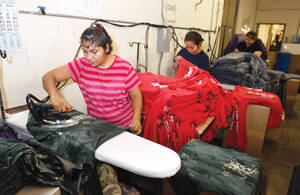For decades the U.S. bishops have supported a decent minimum wage for U.S. workers in keeping with church teaching on a just wage, the rights of working people and the dignity of work, according to John Carr, executive director of the U.S. Conference of Catholic Bishops’ Department of Justice, Peace and Human Development. But efforts to legislate an automatic increase of the federal minimum wage tied to inflation, he said, have been “unsuccessful.”
At the state level, however, there has been some progress. Washington State celebrated the new year by becoming the first state in the nation to have a minimum hourly wage ($9.04) above $9 per hour. According to the Economic Policy Institute, Washington is one of just 10 states with some form of minimum-wage cost of living indexing, which requires that the state minimum wage grow at the same rate as inflation and offers some measure of automatic protection to the real value of the wages of lowest-paid workers. Seven other states—Arizona, Colorado, Florida, Montana, Ohio, Oregon and Vermont—likewise had automatic increases on Jan 1.
This minor New Year’s adjustment is small fiscal good news for the 1.2 million workers in Washington and these other states who will be directly affected, but thousands of other minimum-wage workers around the nation remain stuck at the federal minimum of just $7.25 per hour.
“The core principle underlying the idea of the minimum wage,” Carr said, “is that you ought to be able to raise your family with dignity through your work. The minimum wage falls far short of that now and it ought to be raised.” According to Carr, increases to the federal minimum tend to ripple through the economy, improving wages for all workers.
The federal rate was last changed in 2009 and can be changed only by an act of Congress. Because of that high hurdle, over the last 40 years the inflation-adjusted value of the minimum wage has eroded dramatically. E.P.I. researchers say the federal minimum wage was highest in 1968, at a value of roughly $9.85 per hour in 2011 dollars. That is significantly higher than even the recent $9.04 in Washington, and at $7.25 the federal minimum has declined in value by more than 26 percent since the 1968 peak.
Noting that historical decline, Carr said, “It’s not even a minimum anymore; it’s really a subminimum wage.”
The diminishing purchasing power of the minimum wage matters because, contrary to general expectations, the typical minimum-wage earner is not a burger-flipping teenager. The U.S. Census reports that 80 percent of minimum-wage workers are over the age of 20. Minimum-wage earners are also disproportionately women. Roughly 60 percent of minimum-wage workers are female, despite the fact that women make up only 48 percent of the national workforce. According to the institute, families with a minimum-wage worker rely on those minimum-wage earnings for nearly half of their income. At 40 hours per week, 52 weeks a year, a federal minimum-wage worker would earn just $15,080, a figure that is barely above the poverty line for a family of two.
“With inequality at record levels and still on the rise, indexing the federal minimum wage would be one very basic protection of workers at the very bottom of the income distribution,” writes the E.P.I. researcher David Cooper. “The question we should be asking then is not whether Washington’s minimum wage is too high, but why isn’t the federal minimum wage just as high or even higher?”








